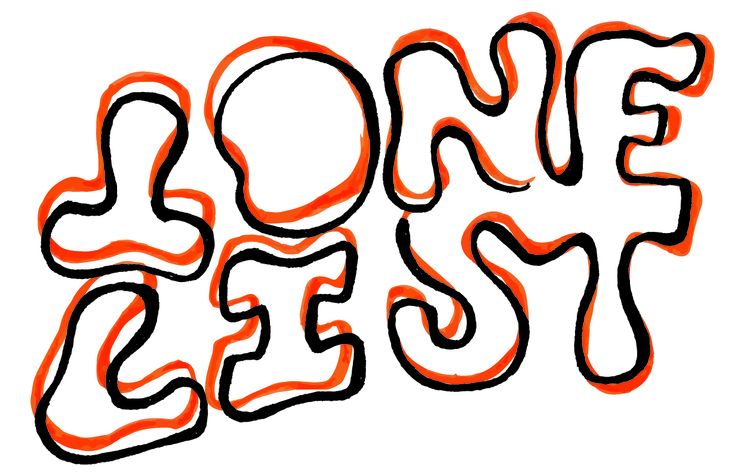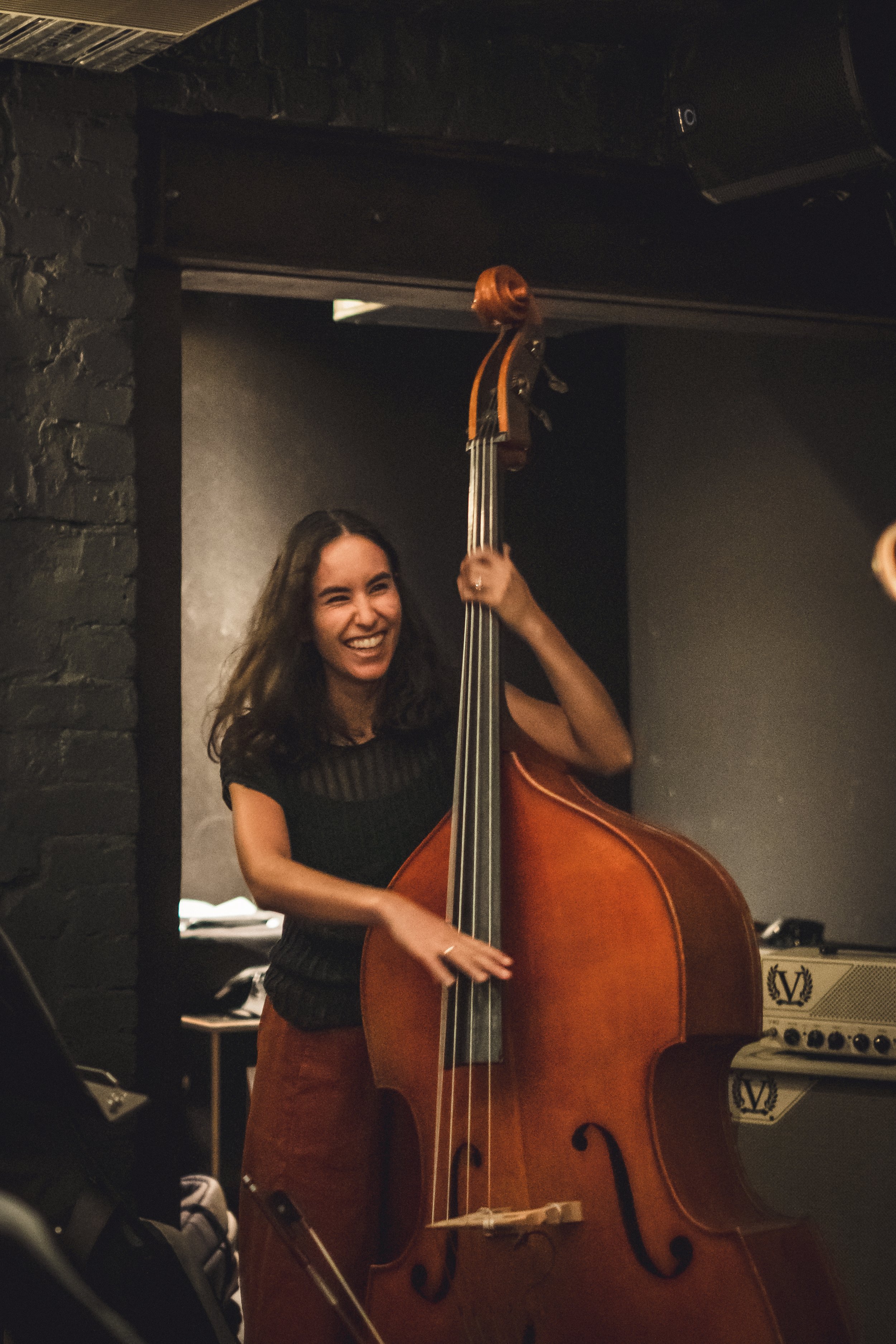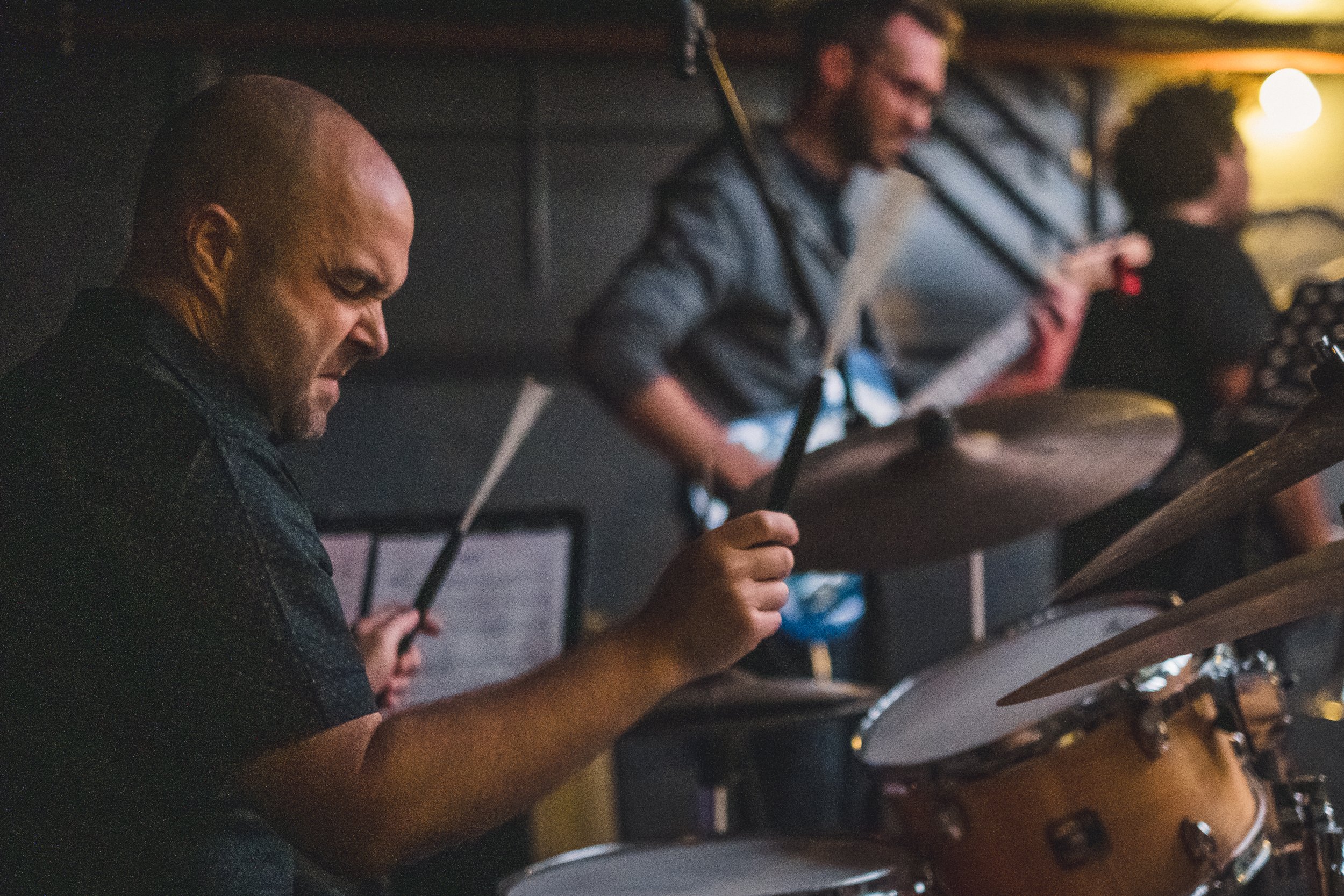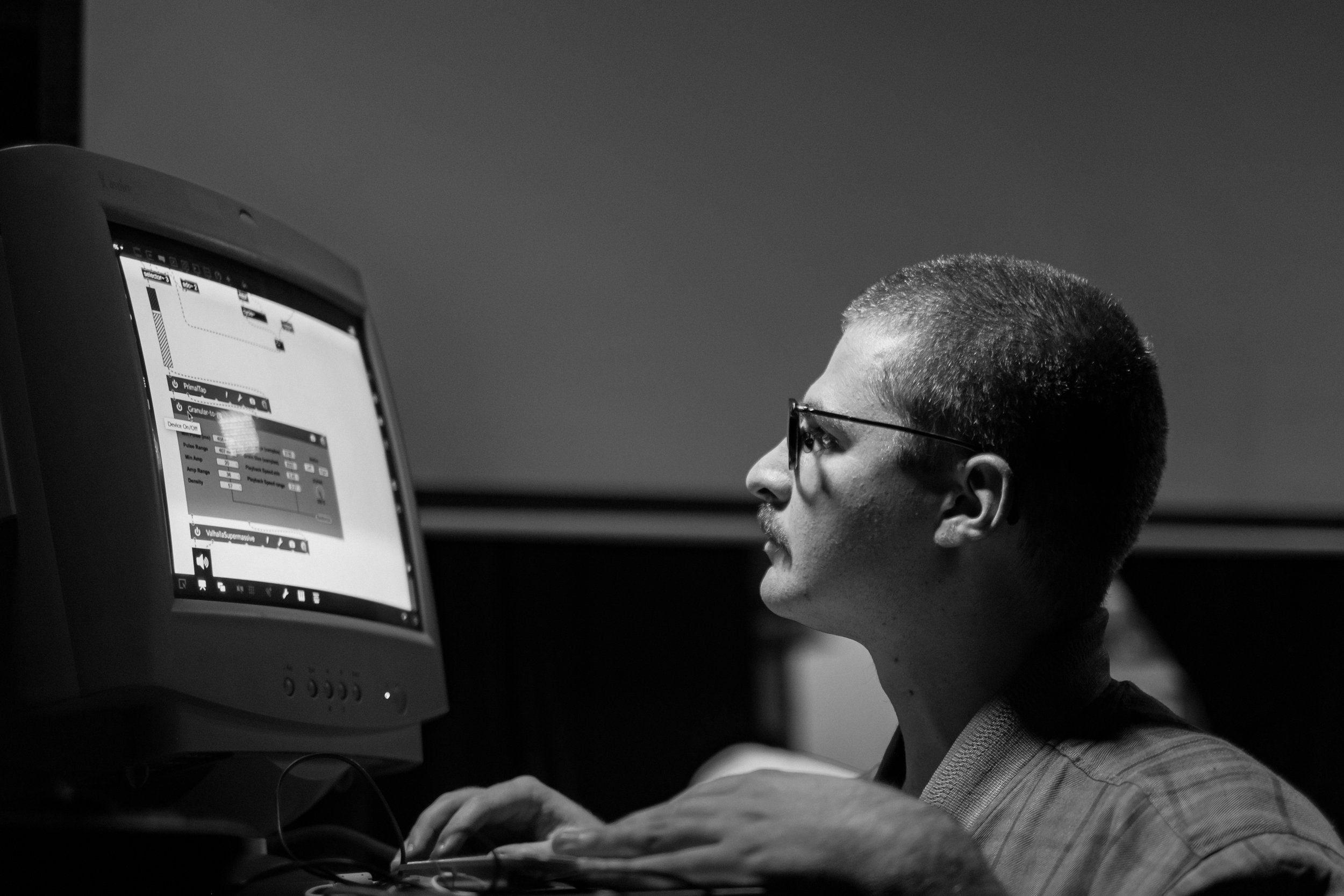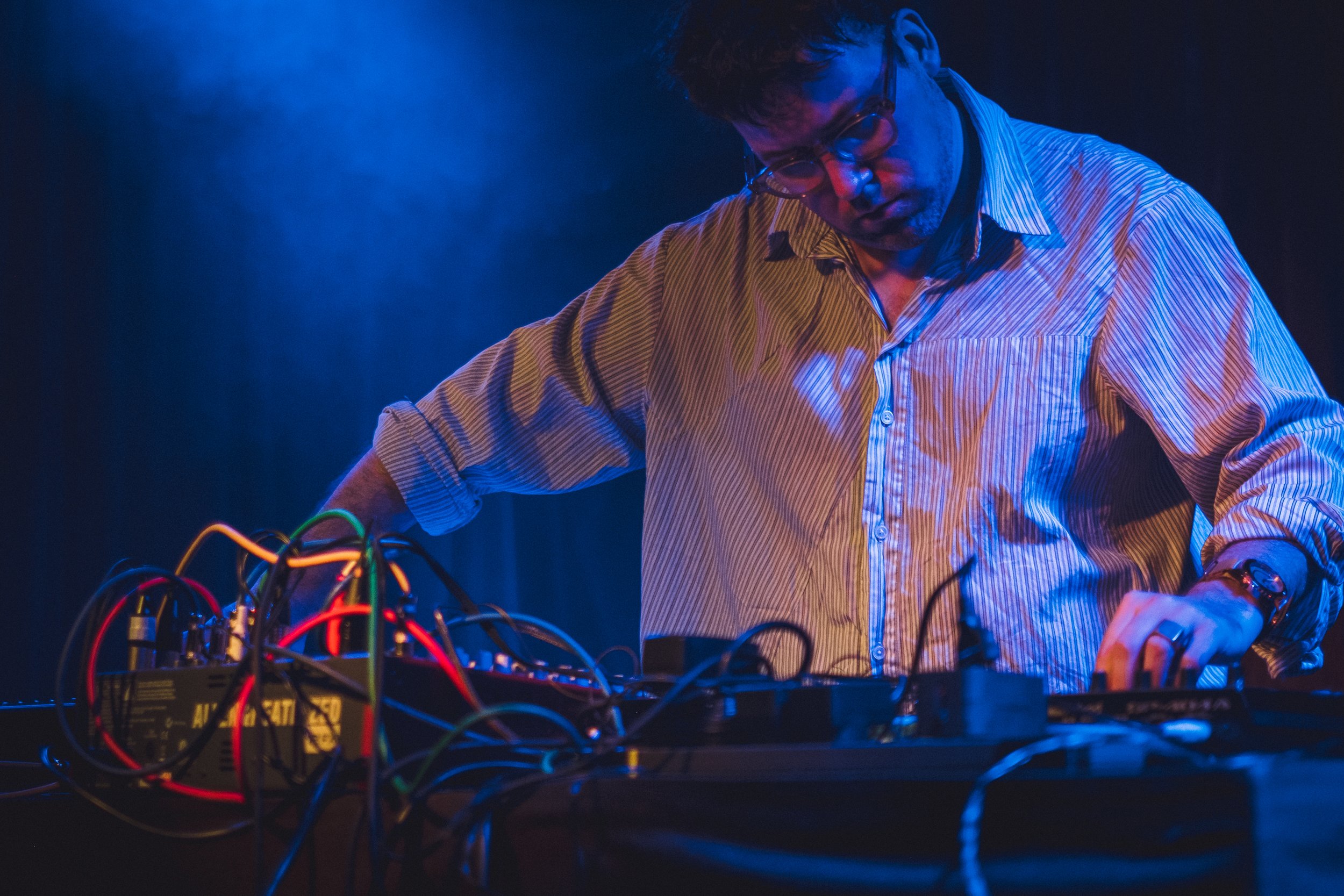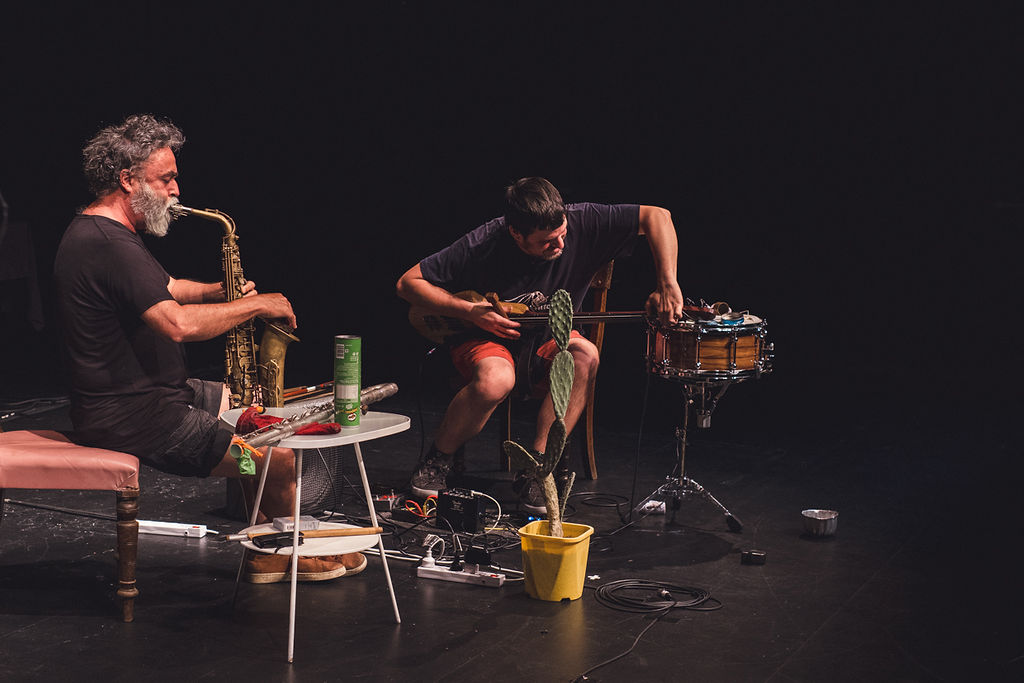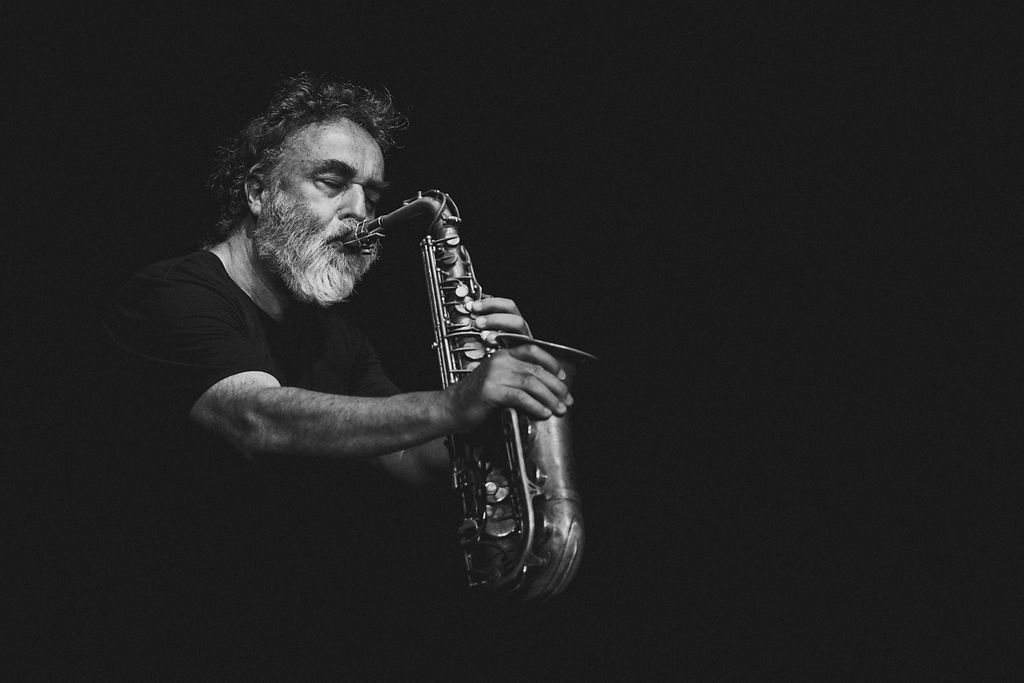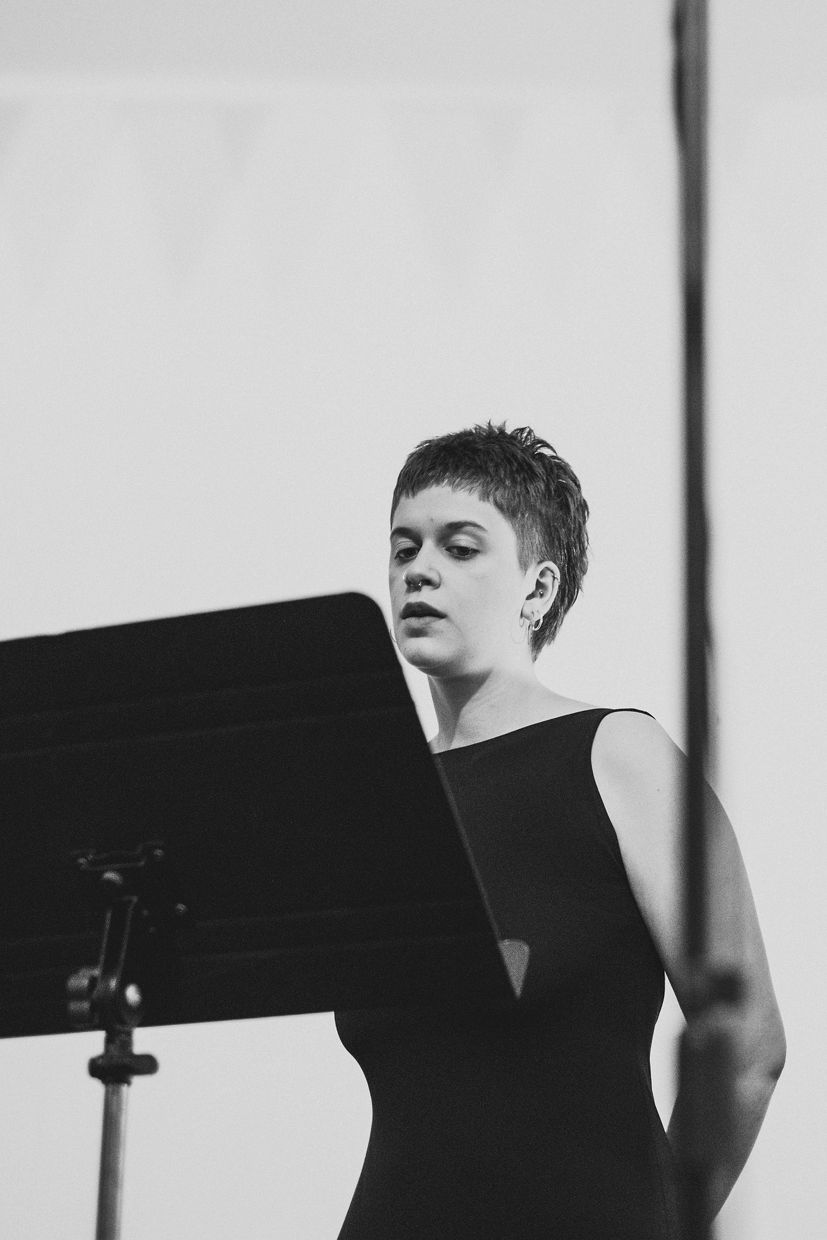Photos by Josh Wells Photography of concerts by Heathcote Blue, HyperUniform, Seacrest Gardens, Nika Mo, James Rushford, jalan jalan & Ben Greene Sextet.
Djuna Lee
#80 - Interview with Djuna Lee & Ben Greene
Interviews by Kate Pass. Photos by James Whineray & Adam Buckley.
Kate: We’re really excited to hear your new band, jalan-jalan. What does jalan-jalan mean, and what can audiences expect on the night?
Djuna: Jalan-jalan means ‘to walk’ in Malay. I wanted our name to capture the energy we bring to the music. I like the way that our name references a walking bass, which creates a sense of movement and forward propulsion. You won’t hear many walking bass lines in our music but some of the more varied approaches I use evolved from these foundations, using groove and pulse as a starting point and moving into more melodic territory to form a more active counterpoint.
Kate: Can you tell us about your journey as a jazz musician, and how you became involved in the experimental side of improvisation?
Djuna: I have many fond memories of going to see PJS gigs at Hyde Park Hotel as a kid. It really inspired me to pursue music and go to WAAPA. Coming from more of a classical background, discovering how to improvise over chords and play jazz tunes was both intimidating and exciting. To some extent I think I’ve always tried to keep that feeling of unfamiliarity and excitement in the music that I play and this is maybe how I became more drawn to freer and more open playing.
Kate: As well as being an incredible musician, you’re also an architect! How does your design background influence your music?
Djuna: I find that both fields take inspiration from one another and there are many similarities in how I approach designing spaces and sounds. The design process can be very slow, sometimes taking years for a concept to become a physical reality so it’s nice to be able to just pick up my instrument and play - maybe this is what draws me to improvised music - the pace at which it can unfold.
Kate: What advice would you give to people experiencing improvised experimental music for the first time?
Djuna: For new listeners, experimental music can be unfamiliar and challenging in its mode of expression, but the uniqueness that can initially be confronting is also the music’s strength. One of the things I love about experimental music is that every musician approaches form in an entirely different and personal way, so the listening experience can be quite vulnerable and revealing. It doesn’t have to be serious or super introspective either; it can be lively, and fun. Jalan-jalan officially endorses dancing at our performances.
Kate: What are you most looking forward to at Audible Edge Festival?
Djuna: I’m feeling pretty inspired from what has been on so far and am really looking forward to Nika Mo’s album launch on April 14 at the Rechabite.
Kate: How would you describe your music? What can audiences expect on the night?
Ben: It’s always difficult to describe your own music, but what I can say is that it’s mostly informed by free jazz, experimental rock, post-bop and noise. There are some specifically composed sections and some loosely-structured free sections, all interwoven with passages of noise and improvisation. Everyone has been gradually incorporating effects into their set-ups as well so I feel like we’ve tapped into a really interesting blend of acoustic and electronic sounds.
Kate: Can you tell us about your journey as a musician, and how you became involved in the experimental side of improvisation?
Ben: I started out playing a lot of punk and metal but over time I found myself drawn to music which incorporated more improvisation. I got deep into progressive/experimental rock and free jazz and eventually found my way to non-idiomatic free improvisation and noise music. Drummers like Chris Corsano and Frank Rosaly were putting out some really interesting solo and collaborative work, so I started exploring similar approaches in my own practice and began experimenting with contact mics and guitar effects pedals. Once I started putting this stuff together, it became a big part of my sound and I brought these elements into the bands I was playing with. From there, it was a natural step to seek out more people to play with and I was introduced into the Perth experimental scene through regular gig series like Noizemaschin! and Outcome Unknown and through affiliation with the fine people at Tone List.
Kate: You’ve worked in such a diverse range of genres, from successful post-rock bands, jazz ensembles and now experimental new music. How does Ben Greene Sextet tap into all these different influences?
Ben: The use of improvisation, effects and noise passages during performance is something that we explored quite a bit in Tangled Thoughts of Leaving, so I feel like that may be one of the more direct comparisons that could be made. Given that the other two members of the trio orphans are also in this sextet, there is definitely some aesthetic and conceptual overlap there as well. Otherwise, I feel that the influence I’ve taken from different experiences is more generalised – things like approaches to structuring free improvisation, to writing and presenting scores, to utilising the strengths of your group and organising/leading productive rehearsals. These are all skills and approaches that I am still developing in leading the group, but I’ve definitely taken on board the ideas of others I have worked with who have handled these things well and have noticed the difference that it can make to the cohesiveness of a performance.
Kate: Your new sextet is an expansion of the trio orphans, and features some great musicians such as Dom Barrett, Jonathan Brittain, Adam Buckley, Dan O’Connor and Finn Owen. Has working with a larger ensemble changed your approach to drumming and composing?
Ben: Ha! Well, in putting the group together I was mostly selecting for people who’s playing I enjoyed and who I felt would be able to connect with the music and bring something special to the mix. With Dan and Dom on board, there is obviously a link to orphans, but I also have a noise-rock duo project with Adam called Dez Cartez, and have played with Finn and Jonathan in various funk, jazz and free settings. That is to say, I feel this group is an expansion of all of those musical relationships and so working with everyone at once has caused me to consider ways of integrating the drumming approaches I have taken in those different settings into one broader approach which can bring it all together. I’m going from more conventional jazz time-keeping, to playing totally free, to textural accompaniments, all while triggering effects and generating loops. These are all things I’ve done before but not necessarily in the same set of music, so it has been a great challenge to undertake.
As for the composition aspect, it is all quite new, so it is not so much changing as it is forming my approach. This will be the first time that I am presenting my own compositions in public, so I am equally terrified and excited about it!
Kate: What are you most looking forward to at Audible Edge Festival?
Ben: I think I’d have to give that nod to Paul Briggs and Gracie Smith, who are playing a duo set the night after our gig. Paul is the guitarist from Tangled Thoughts of Leaving and Gracie is their new drummer, who is also very active in the Perth experimental scene. Very interested to see what these two are up to – I’m expecting some noisy/doomy/jazzy vibes!
Kate: What advice would you give to people experiencing improvised experimental music for the first time?
Ben: I would say be sure to surrender yourself fully to the experience. As well as the expression of musical ideas, sometimes improvised music is just as much about the effect that sound itself has on the listener over time. This can mean that it requires a certain level of engagement in order to be fully appreciated (and sometimes closing your eyes can help). I personally have been taken on some amazingly transcendent and introspective journeys by great improvised performances. I suppose this can be true for all music, but I think being conscious of this can help to bridge any gap that you may notice between yourself and the performance. Having said that, improvised music is just like any other music in that sometimes it just isn’t very good (haha), or may not be to your taste… but don’t be discouraged! Come out and see a bunch of things and you may be pleasantly surprised.
#68 - Interview with Eduardo Cossio & Djuna Lee (Knots)
#66 - Audible Edge 2019
#57 - Lee/Cossio/O'Connor Artifactory Sessions
#53 - High Tide / Breaking Waves
Thanks to James Whineray, High Tide, Fremantle Festival and Tura New Music.
#42 - eszetts at Automatic Sound Series
TLQ#2 - Djuna Lee
The same questions, asked to different improvisers in Perth. Credit for the idea, and some of the questions, goes to the amazing Addlimb archive.
Photo by Josh Wells Photography.
1. What instrument or equipment do you use to improvise, and what is your relationship with this equipment/instrument?
From a very young age, before I was even tall enough to play it, I was drawn to the double bass. There was something about the tone and depth of sound that I really loved. I was very lucky to be surrounded by music as a child. My parents would take me to all sorts of concerts from ACO to Perth Jazz Society. I started playing violin from the age of 3 and it seemed very natural to progress to the bass as I grew.
Today, I’m still discovering so much about the instrument and really love exploring the vast number of sounds and range of techniques that are possible on such a large stringed instrument.
2. What led you to improvised music?
After learning classically for a number of years I found myself wanting to explore new styles of music and became interested in jazz. Discovering how to improvise over chords and playing jazz tunes in small ensembles was new and exciting. While many of my early influences stemmed from developing an understanding of the history of jazz I started to become more and more interested in the distinct sound coming out of Australia’s jazz community and really wanted to contribute in some way to this sound. Moving to Melbourne was a great experience, being in a new city and surrounded by a new group of musicians made me feel free enough to experiment and try new things. Playing more freely and openly and collaborating with artists of other disciplines became the new exciting thing. It was a similar experience coming back to Perth and meeting a whole new community of musicians interested in improvised music and it’s exciting to be a part of such an open and welcoming group of people.
3. What keeps you improvising? What do you think makes this music important, either personally, socially, politically, etc.
I see improvised music as an opportunity to interact and communicate with people and create something out of this interaction. I enjoy the spontaneity and sense of playfulness of this and try to not think too much into it but feel that music as with art has purpose if it can make someone question or think of things a little differently.
4. What are your feelings on the relationship between planning and spontaneity in improvisation?
I’m not too opinionated on this. I would say that my views differ depending on the situation and who I’m playing with. In Lee/Jacobs/O’Connor we sometimes base our improvisations on an abstract narrative that gives some sort of direction and sets a general mood to start our improvisations. Sometimes I approach a solo performance by focusing on a particular technique or concept to develop and explore, I find this helps to create cohesion.
5. How do you evaluate or reflect upon improvisations you’ve played? How does the evaluation of a recording differ from the evaluation of a performance?
This is difficult. Often, I find that the way I perceive a performance ends up being completely different to how I find it upon listening back to it. I try to not dwell on a performance too much. I find it much more constructive to talk through ideas with everyone in a rehearsal setting and work through ways to improve the music there.
6. Do you think there is room for discursive (as opposed to non-discursive) thought in improvisation? Can discursive thoughts whilst playing be productive rather than distracting, and if so, do you have an idea as to when this might be the case?
I’d be interested to hear what other improvisers think about this. I find it extremely difficult to go through a performance without thinking at all but do aspire to minimize this as much as possible. There is a danger in over thinking whilst playing as I find that it really limits my playing. I do think that there is room for discursive thought in some instances though, especially when thinking about the overall architecture or structure of an improvisation.
7. Can you name three albums/pieces/experiences that inspired you to start improvising, and three that are currently inspiring you?
- Ornette Coleman. Ornette’s music was probably the first freer sounding music that I heard. Charlie Haden’s playing always resonated with me and has had a very strong influence on my sound and approach to playing.
- Miles Davis, Plugged Nickel Concert. I started to be drawn to more open playing in a jazz context and was particularly inspired by the level of interaction and freedom that Miles’ 60s quintet had whilst playing over jazz standards.
- Many, many Australian musicians. Dave Ades, Allan Browne and Zac Hurren to name a few.
- I have been getting more into solo playing lately and am focusing on exploring more extended techniques and sounds on the bass. Two players who I’ve been really getting into are Mark Dresser and Mike Majkowski.
- I think musically, I draw just as much inspiration from the people I’m surrounded by and playing with as I do from listening to recordings. The Perth improvising community has been doing lots of great things and there are constantly interesting gigs, workshops and events to be involved in.
- I am also inspired by more and more wide ranging things these days. I often find visual experiences to be just as inspiring as musical ones.
Lee/Jacobs/O'Connor at Success Sounds.
Song for Charlie (Charlie Haden) by Djuna Lee
Question Time
Blind Spot
